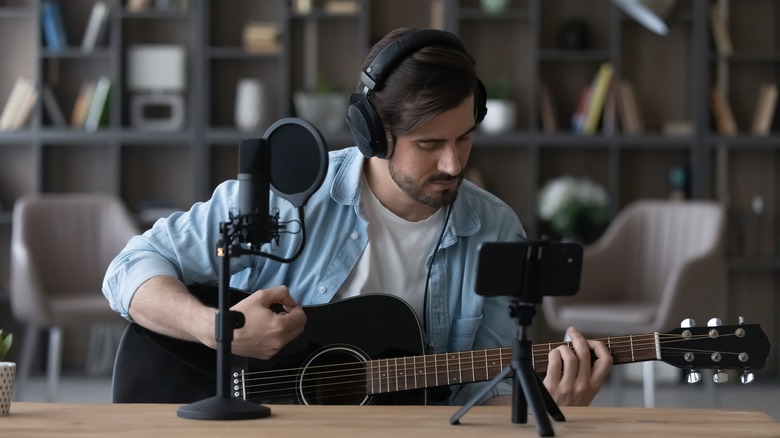
fizkes/Shutterstock
These days, musicians are fortunate to have one device they can rely on for multiple functions: the smartphone. Whereas once a singer or instrumentalist would lug around notepads, tuners, sheet music, and more, now a smartphone is capable of performing a range of tasks to aid music creation, practice, and performance. Some of the most exciting developments in music creation are taking place on Android tablets and phones. However, with so many different apps available that all claim to take your artistry to the next level, it can be hard to cut through the noise and find the most useful ones.
Instead of focusing on music production or DJ apps for Android, this article will take a look at five of the best apps for singers, instrumentalists, and other musicians. From apps that help you study and practice to those that put unlimited sheet music at your fingertips, we’ve rounded up five of the best, must-have Android apps for musicians. These mobile music apps will help you with notation, ear training, music theory, and songwriting, all from the palm of your hand.
Each app on this list was selected for its universal appeal to musicians of all genres, specialties, and skill levels. Whether you play piano, prefer to shred guitar, or even if your instrument of choice is your own vocal cords, these apps will help you strike a new chord so you can write the next song of the summer. Let’s dive in to explore some of the best Android apps for musicians in 2024.
Perfect Ear
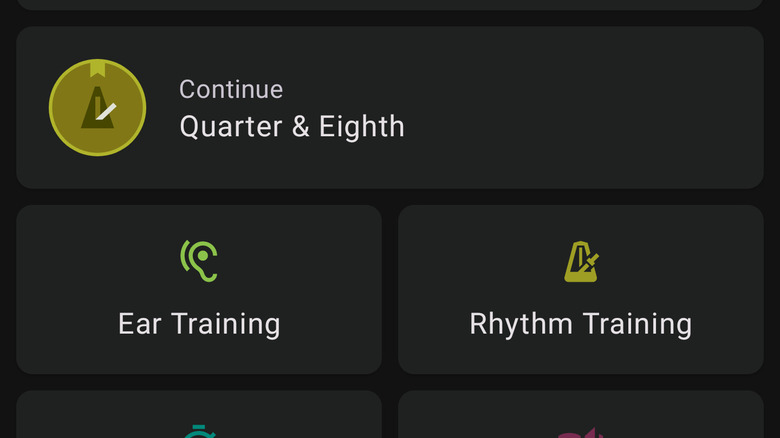
Max Miller/SlashGear
Every musician knows much of the craft is practice, and that’s where the first app on this list excels. Perfect Ear helps you master various areas of musical proficiency for people of varying levels of skill. Whether you need to learn how to keep a rhythm or find out more about music theory, Perfect Ear comes packed with a range of guided courses, drills, and exercises to help you become a better musician. Whether you’re an instrumentalist or vocalist, it’s a great way to keep your skills sharp.
Perfect Ear has an extensive selection of courses and tests for free, but further packs of exercises can be purchased from within the app. Perfect Ear doesn’t pad out its free version with ads like some other apps can. In fact, there’s not a single ad in sight. In my time with Perfect Ear, I used ear training exercises to identify chords and scales, rhythm training to keep a perfect tempo, and I dove into music theory courses to refresh my memory on triads and seventh chords. Extra lessons and tests cost between $1.49 and $1.99 per pack. Purchasing all the extra material would set you back $11, which is not a bad deal, but it’s great that the purchases are served buffet style, so you can buy only what you need.
Advanced musicians might not need Perfect Ear, as it seems designed for those who are still mastering their craft. It has tools like a daily practice reminder, as well as gamification, to make that practice more addictive. You can also connect the app to Google Play Games to compete on global leaderboards.
Pitched Tuner
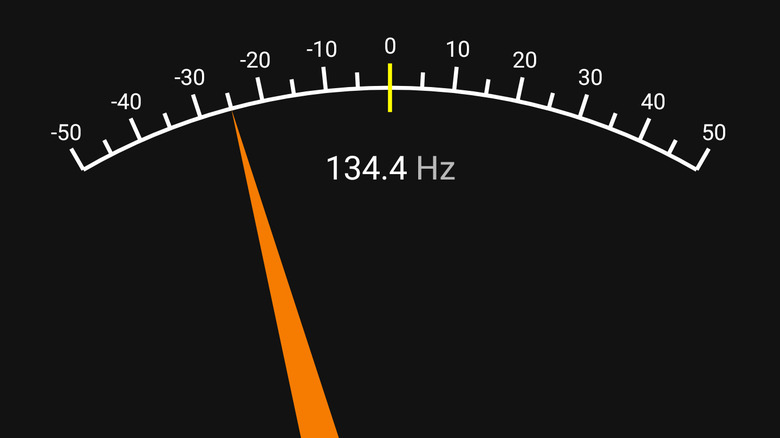
Max Miller/SlashGear
A tuning app is an essential tool that musicians depend on, and an excellent option is Pitched Tuner. The branding is fittingly chipper for an app that does one task enthusiastically well. Pitched Tuner can not only help you tune a guitar, piano, or other instrument, but it’s also a useful tool for those who, like me, have trouble identifying notes by ear while writing music.
Pitched Tuner has two interfaces: a tuning mode with chromatic or instrument-specific submodes, and a mode called Sound Note that plays perfect notes and chords. This allows you two ways of tuning your instrument. You can either play the instrument and see how close it reads to perfect, or play the perfect note and tune to that. Between those two methods, it’s pretty easy to get everything tuned quickly. Even if you’re not working with live instruments, Pitched Tuner can help you make sure that virtual instruments such as VST plugins are tuned correctly — yes, digital instruments can be out of tune, too. If you have a musical idea but don’t know how to translate it into notes, you can sing it into Pitched Tuner and observe the notes it identifies.
While Pitched Tuner is free, there’s a pro upgrade that costs $4.99. However, all it does is remove the ads, which frankly aren’t very intrusive to begin with, and allow you to add your own custom tunings.
UnMix
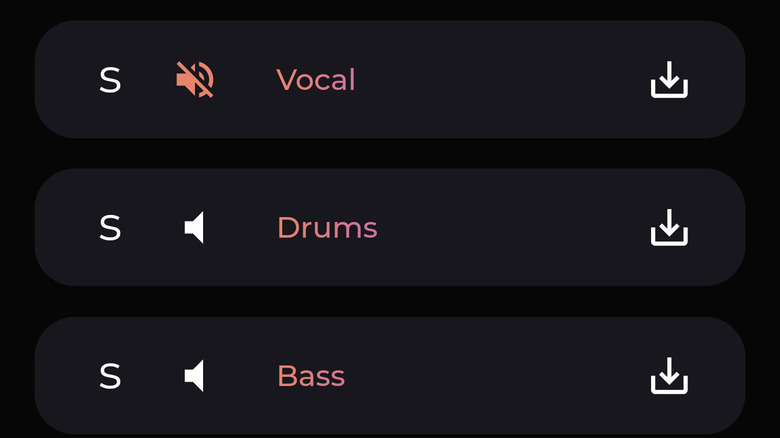
Max Miller/SlashGear
If you’re a cover or remix artist, or if you wish to create your own karaoke music, you’ve probably always wanted a way to get perfect backing tracks with the vocals removed. You might also have wanted to get the vocals from a song without any of the instrumentation. Our next app is called UnMix, and it does all of this surprisingly well.
The one irritating aspect of UnMix is that it’s packed with microtransactions and ads. While using my few free credits to test the app, I was subjected to an AI ad using the stolen voice of LeVar Burton. Nevertheless, beyond that UnMix quickly separated the Young Thug song I fed into it, creating four separate layers for vocals, drums, bass, and other instruments. The separation was remarkably clean, and if I had wanted to remix the song, I’d be able to use any of the layers in that remix without worrying about the sound quality.
Once separated, each layer of a song can be saved individually to your Android device or shared via the Android Sharesheet. This means they can be easily exported to your DAW or other music software, sent to collaborators, and more. If you can put up with the aggravating ads, UnMix is the best tool for song separation I’ve tested so far.
Musescore
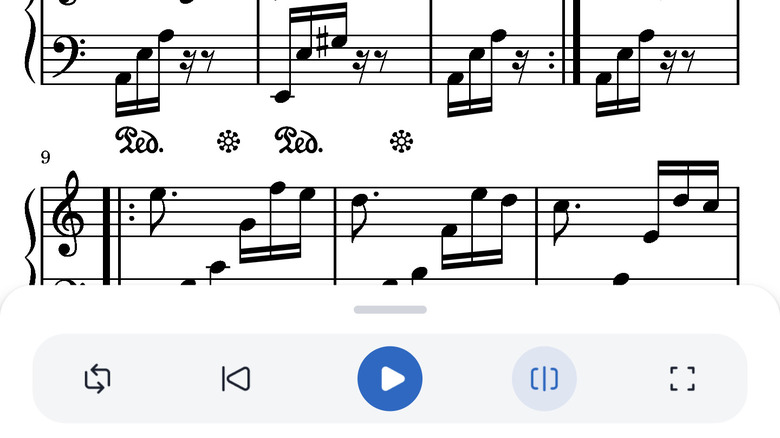
Max Miller/SlashGear
When it comes to live music, even a skilled virtuoso needs sheet music to perform from, and that’s where the app Musescore comes in. Whether you’re looking to practice with classical scores or the latest chart-topping pop hits, Musescore has a massive library of sheet music. Far from simply displaying static images of the sheets, which you could search online for free, Musescore justifies its subscription price by packaging each score in a robust player interface.
In addition to showing where you are in the sheet music, Musescore lets you transpose scores, download them, and even display a piano roll to help players follow along. There’s also a library of music courses on video, though they require an additional subscription within the app. The biggest benefit of Musescore is simply the vastness of its library. From movie and game scores to the latest Doja Cat singles, Musescore has sheet music for all.
It’s only worth paying for Musescore if you’re a musician who regularly interacts with sheet music. If you’re constantly spending time searching for it and would benefit from smart tools to help you learn new pieces of music more easily, then Musescore is one of the most robust platforms out there and should satisfy even the most voracious players.
Lyric Notepad
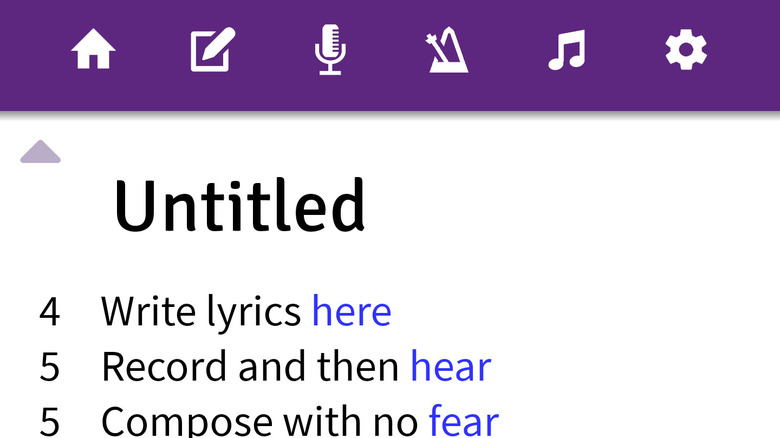
Max Miller/SlashGear
For songwriters, having a reliable place to write down song lyrics is essential. While notetaking apps such as Evernote, OneNote, or even your Android phone’s notes app can work in a pinch, many songwriters want an app that caters to their musical needs. That’s where Lyric Notepad shines, as it’s designed from the ground up to help you write lyrics that your audience can’t help but quote.
Lyric Notepad doesn’t so much help with lyric writing as it does facilitate your talent to improve your lyric writing at a high level. It includes multiple ways to write lyrics, either in a regular, notepad-style format or on sheet music. There’s also a built-in rhyme dictionary with support for both exact and near rhymes. Additionally, rhymes can be highlighted within the text field, with each rhyme receiving a different color. Best of all, the rhyme detection feature works with end rhymes or internal rhymes. Furthermore, a built-in recorder lets you sing and save your lyrics so you can remember how they’re supposed to go later. Even the metronome does a lot more than you’d expect. It can sync with any music playing in the background or with an uploaded audio file.
The full version of Lyric Notepad costs $1.99, which isn’t a bad price at all, especially if you find yourself constantly needing to jot lyrics down as they come to you. The interface looks a bit outdated, but the app makes up for it with clever features to help you write the next big hit.
Methodology

Image Source/Getty Images
Each app on this list was selected based on a number of factors, including ease of use, practicality, and the ever-elusive bang for the buck. Each app was tested as part of a musical workflow, and apps that require payment to unlock functionality were tested using the paid version.